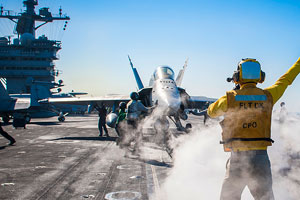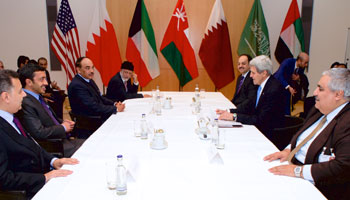It was no ordinary event when 26 countries’ representatives met on February 6 in Munich to discuss how best to confront the challenge of ISIS. What the so-called “Islamic State,” or ISIS, or ISIL represents differs from one person to the next. To people immediately adjacent to lands in Iraq and Syria that ISIS has not yet conquered, the militant movement is a mortal threat. Whether Shia, Sunni, Christian, Arab, Kurdish, or other in nature and orientation, polities that neighbor ISIS-controlled areas have seen their national sovereignty, political independence, and territorial integrity threatened.

The attributes of national sovereignty, political independence, and territorial integrity are no ordinary phenomena. Together they have been and remain the most important criteria for admission into and membership in good standing within the United Nations.
Unfortunately, the United States in the course of its invasion and occupation of Iraq beginning in 2003 had already smashed to smithereens each of these criteria. Even worse is that the United States simultaneously blasted into nonexistence what exists in the American Constitution – and was previously enshrined in the Iraqi Constitution – namely: provisions for a people’s domestic safety, external defense, enhancement of their material wellbeing, and the effective administration of a civil system of justice.
In so doing, the United States contributed mightily not only to the formation of ISIS but also its focus and priorities. The poignancy of this reality must not be lost. It is but one among other inconvenient truths that plague America’s predicament in seeking to navigate the shoals of the storm its shortsighted actions created.
ISIS’ ideology and praxis also menaces many. To the peoples it has conquered and others that lie in wait within its crosshairs it portends ill towards everything they hold dear. Beyond worldly possessions, ISIS threatens the existential credibility of national security.
Further, ISIS demands ransoms. It takes hostages. It confiscates property. It targets people’s very lives. In the eyes of many among ISIS’ actual and would-be victims to date, its threats carry a “Made in America” label.
The Bush administration’s decision to wage war against Iraq opened these floodgates, fueled further by its invasion and occupation occurring despite Iraq’s not having attacked the United States or posed any grave danger to American interests. Here, perspective is paramount. In the eyes of America’s would-be friends, allies, and strategic partners in the fight against ISIS, Washington officialdom would do well to acknowledge the difficulty of achieving its legitimate objectives – regional peace, security, and stability – given America’s position among many Arabs and Muslims as the pariah of the Western world for what it did to Iraq, once the zenith of Arab and Islamic civilization.
No Cost-Free Solution
America’s perceived inability to counter and halt the spread of such U.S.-induced horrors – indeed, to stop them in their tracks – has consequences for friend and foe alike. These include the regimes, bureaucratic personnel, and popular support bases in Baghdad and Damascus, the two nearest polities that have yet to succumb to ISIS’ militant onslaught. Also in ISIS’ sights are the governments and peoples of its near neighbors once removed – Jordan and Turkey, and, to a lesser extent, Lebanon and Israel.

Importantly, and notwithstanding what in varying degrees are their relatively safer physical distances from ISIS, the GCC countries – Bahrain, Kuwait, Oman, Qatar, Saudi Arabia, and the United Arab Emirates – have much to fear, too. While Kuwait and Saudi Arabia, adjoining Iraq, are the most threatened, few doubt that ISIS is having an intimidating effect upon all six GCC members.
The reason is clear: ISIS stands at one end of the political, security, governance, and ideological extreme. At the other end stand the GCC countries with their overwhelmingly Western-oriented foreign policies, international relations, economic orientations, and defense as well as higher education systems, together with the nature, scope, and focus of their overall modernization and development. It is in these contexts that the murder by burning of the American-trained Jordanian pilot, Moaz al-Kasasbeh, skilled in flying a U.S.-manufactured aircraft – two Western symbols additionally facilitative of ISIS followers’ recruitment, retention, and inspiration – has further galvanized overall Arab and GCC opinion regarding the moral necessity of defeating ISIS, its alternative system of governance, and practically everything else that it represents.
American Grandstanding Run Amok
Ill-informed commentary by grandstanding Members of the U.S. Congress and television talk show pundits has not helped. It has largely missed these crucial contexts and prisms for perspective. In so doing, it has not only ignored causative factors that shed light on ISIS’ rise and the roots of its anti-Western/anti-American ferocity. It has also downplayed the extent to which the GCC countries and Jordan have emerged as the strongest and most reliable local partners in the American-led coalition against ISIS. Jordan and fully half of the anti-ISIS coalition’s GCC allies – Bahrain, Saudi Arabia, and the United Arab Emirates – are military allies, committing their state-of-the-art American weapons to the mission of degrading the militant movement’s assets. The logistical and operational contributions of others are no less important.
[pullquote]Insufficient numbers of American analysts have recognized how the GCC role in fighting ISIS gives regional and local legitimacy to the battle.[/pullquote]What insufficient numbers of American analysts have recognized to date is how the GCC role in fighting ISIS gives regional and local legitimacy to the battle. In their positions and roles among the world’s most prominent defenders and leaders of Sunni Islam, the GCC states perceive their forms of rule, representation, and responsiveness to citizens’ justifiable needs, concerns, and interests as the time-honored Muslim antitheses to ISIS. As such, they have been unabashedly candid in emphasizing an obligation and interest in ridding Islam of the radical extremist movement that ISIS represents.
Among other features of the GCC countries having risen to their responsibility in this instance is a matter of no small moment. They have shorn Tehran of any potential legitimacy from claiming that the Islamic Republic of Iran, and not the GCC, representing half a dozen countries, is the “hero” of Islam.
Forgotten Among the Attention on ISIS
Additionally, the alliance’s zeroing-in on ISIS helps the non-radical Syrian opposition fight the armed forces loyal to Syrian President Bashar Assad. Two GCC countries, Qatar and Saudi Arabia, together with Turkey, are training an anti-Assad army that could arguably form the nucleus of a future Syrian national force. Overall, such military efforts enhance the joint goals of the GCC countries and the U.S.-led anti-ISIS coalition alike.
Even so, a continuing GCC goal receiving little play in the American media is for the Obama Administration to be clear in its intentions regarding Assad. In the GCC country heads of state and ministerial-level meetings with their U.S. counterparts, there has been a constant reminder of the GCC position on Syria. It underlines where GCC leaders are coming from with regard to what for the member-states is one of their most frequently stated interests and key foreign policy objectives. Further, at the GCC Foreign Ministers’ meeting with Secretary Kerry in Munich to discuss ISIS, the ministers added to their reminders regarding Syria a list of parallel concerns about Iraq, Yemen, and the Iranian nuclear issue.

What therefore needs greater emphasis by U.S. officials anxious to strengthen and expand the GCC countries’ essential assistance in fighting ISIS is clear. It is that the White House’s anxiety regarding its Arab allies must not obviate the need for vigilance by the GCC and the United States alike regarding these additional issues. To be sure, the fight against ISIS is central to the U.S. strategic posture in the Arab countries, the Middle East, and the Islamic worlds. But so, too, is the simultaneous imperative of the American-led coalition’s need to address these concerns of immense strategic significance to the GCC countries. After all, the foreign policy objectives of friends and allies are not accomplished automatically or by accident or coincidence – usually, they are achievable only if respect for their respective valid requirements are acknowledged, implemented, and safeguarded.
GCC-U.S. Cooperation Moving Forward
With the 2016 American elections heating up, it is tempting for Western Congressional and media commentators, together with would-be policy formulators, to search for catchy sound bites pertaining to what they contend ought to be done regarding ISIS. In and of itself, there is nothing objectionable in that. What is unhelpful, however, is the cacophony of shrill statements – ranging from calls for “boots on the ground” to condemning the Obama Administration for refusing to “declare war on radical Islam” to unfairly and inaccurately criticizing Arab allies for their lack of participation in the anti-ISIS coalition . Such sensationalist rhetoric does nothing to illuminate the issues, interests, and involvement for the parties involved. And they contribute nothing to one’s insight into and awareness as well as appreciation of GCC concerns regarding ISIS, Syria, Iraq, Yemen, and Iran’s nuclear program.
Such insights, awareness, and appreciation are not only essential to an interested public’s knowledge of what is in play. They are vital to an understanding of what is and is not possible regarding the anti-ISIS coalition’s quest for regional security and stability, without which the goal of ultimate success in the campaign against violent extremism will remain in doubt.
At the end of the day, reality brooks no illusion. The prospects for eventual effectiveness in this campaign are twofold. They lie, on one hand, in addressing the Western- and especially American-centric regional roots of ISIS’s emergence, inspiration, and staying power. On the other, they lie in greater coordination of U.S.-GCC efforts to do more than just unleash their military might in a bid to counter the threat posed by ISIS.
*****************************
Dr. John Duke Anthony is the Founding President & CEO of the National Council on U.S.-Arab Relations.
This post was updated for clarity on August 12, 2015.
*****************************
Further Reading from NCUSAR:
- Dr. John Duke Anthony – “Gulf Cooperation Council Establishes Unprecedented Joint Military Command” (December 11, 2014)
- Dr. Imad Harb – “The Return of Strong GCC-U.S. Strategic Relations” (November 26, 2014)
- “The Gulf Cooperation Council: Role in Regional Dynamics” Session from 23rd Arab-U.S. Policymakers Conference (October 28, 2014)
- Dr. John Duke Anthony Responds to Questions Regarding the U.S.-GCC Relationship (June 5, 2014)
- Dr. John Duke Anthony – “The Gulf Cooperation Council: Deepening Rifts and Emerging Challenges” (May 22, 2014)
- Dr. John Duke Anthony – “The Future Significance of the Gulf Cooperation Council” (June 7, 2012)
- Dr. John Duke Anthony – “Strategic Dynamics of Iran-GCC Relations” (May 11, 2012)
